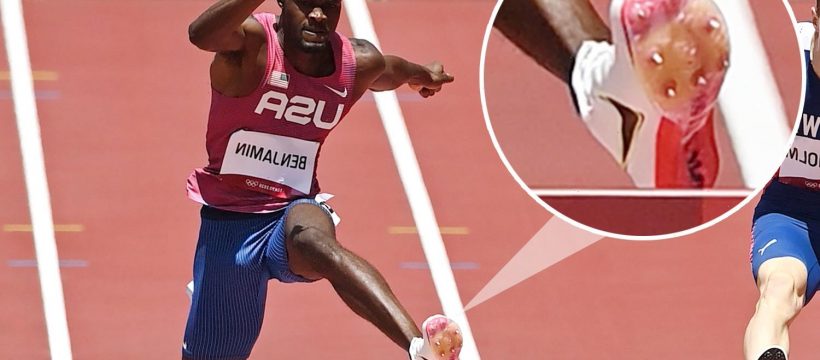IT WAS dubbed one of the races of the century and yet the Tokyo Olympics' 400-metre men's hurdles final soon became shrouded in controversy.
Norway's Karsten Warholm won gold by obliterating his own world record, which was also beaten by Rai Benjamin of the United States in silver.
Despite taking 0.76 seconds off the previous best time, Warholm took aim at his opponent and described his shoes as 'b*******'.
Warholm, 25, said: "If you put a trampoline there I think it’s b*******.
"I think it takes credibility away from our sport. I don’t see why you should put anything beneath a sprinting shoe."
While the victor's Puma EvoSpeed Future Faster+ shoes take advantage of new and revolutionary technology, there has been increased suspicion of Nike's creations in recent years.
Warholm's shoe was designed in collaboration with the Mercedes Formula One team and is reinforced by a carbon-fibre plate in the sole to provide extra strength, balance and bounce.
The Norwegian added: "What I can say about the shoes that I’ve been developing in a collaboration between Puma and the Mercedes Formula One team is that we’re trying to make it as credible as it can be.
"Yes, we have the carbon plate but we have tried to make it as thin as possible because that's the way that I would like to do it.
"Of course, technology will always be there but I also want to keep it down to a level where we can actually compare results. That’s important."
Meanwhile, Benjamin’s Nike Air Zoom Maxfly shoe goes further with an air pod that provides even greater spring in each of the athlete's steps.
This is within the guidelines, which World Athletics have amended a number of times of late amid the controversy.
I’ll wear different shoes and still run fast. It doesn’t matter, in all honesty, at the end of it.
The soles of athletes' shoes tended to remain under 15 millimetres before the technology emerged, leading to a 30mm and then a 25mm limit being introduced for events longer than 400 metres.
Benjamin, 24, defended his performance on Tuesday as he took over half a second off the previous world record despite coming second.
He namechecked ex-record holder Kevin Young and Olympic great Edwin Moses in defining his efforts, and said: "People say it’s the track, the shoes…
"I’ll wear different shoes and still run fast. It doesn’t really matter, in all honesty, at the end of it.
"I mean, there’s some efficiency in the shoe, don’t get me wrong, and it’s nice to have a good track but no one in history is going to go out there and do what we just did just now, ever.
"I don’t care who you are, it could be Kevin Young, Edwin Moses… all respect to those guys, but they cannot run what we just ran just now."
BOLT REGRET
The controversy has extended to distance running with Nike 'super shoes' leading to more records tumbling.
However, not every athlete has deals to run with the American manufacturer and rival producers can be slow to catch up to innovations.
One critic is Usain Bolt, who sees the upturn in speed across the board as unfair on those who raced in previous eras.
The Jamaican legend believes he could have run faster had he been given the luxury of the 'super shoes'.
Bolt told The Guardian: "I don’t know for sure. But definitely much faster. Below 9.5 seconds for sure. Without a doubt."
He later added in a chat with Reuters: "When I was told about it I couldn’t believe that this is what we have gone to.
"That we are really adjusting the spikes to a level where it’s now giving athletes an advantage to run even faster.
"It’s weird and unfair for a lot of athletes because I know that in the past [manufacturers] actually tried and the governing body said, ‘No, you can’t change the spikes’.
Two years from now, we'll have a good feeling of what's truly an exceptional performance in the new era.
"So to know that now they are actually doing it, it's laughable."
IAAF president Sebastian Coe, who won the 1,500m gold in consecutive Olympic Games, is less concerned.
Seb Coe wrote in the Telegraph in March: "To lay it entirely at the door of technology is to focus on only one of many multi-faceted and interlocking factors that must all come together to run that quickly."
One thing is for sure: the innovation will continue.
Geoff Burns, a biomechanics and sport performance researcher at the University of Michigan, said before Tokyo 2020 that technologies across the manufacturers will likely align to reveal the new era's true benchmark.
JOIN SUN VEGAS: GET A FREE £10 BONUS WITH 100s OF GAMES TO PLAY AND NO DEPOSIT REQUIRED (Ts&Cs apply)
He told AFP: "The way the fast performances in the distance and mid-distance races are celebrated by fans, announcers and the media is still likely overdone for their respective importance.
"That is, the sport still hasn't completely re-calibrated what's good and what's great. That will take a bit more time and more racing.
"I suspect by the end of next year, we'll be close, and by two years from now, we'll have a good feeling of what's truly an exceptional performance in the new era."
? TOKYO OLYMPICS LIVE: All the latest from the Games with our live blog
? WHAT'S ON TODAY? Best bits to watch at the Olympics and UK times for your favourite stars
Source: Read Full Article


